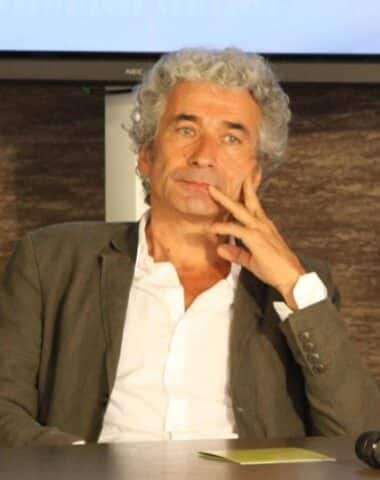Engineer-philosophers: thinkers of the future and men of action
- If traditional philosophical speculation is struggling to find its place today, a new figure is emerging: the engineer-philosopher.
- As an observer and actor in the technological developments that are transforming our world, someone who has a keen sense of the common good and recognises the responsibility of such.
- The engineer-philosopher lives in an age haunted by crises, therefore relying on the betrayed promises of the past to shed light on future transformations.
- Innovation today comes to terms with nature, instead of seeking to dominate it as in classical philosophy.
-
Pascal and Leibniz once embodied the image of philosophers that are men of science. Has this imagedisappeared?
The twentieth century has seen a considerable change, with an unprecedented expansion of scientific and technical knowledge, which limits the claims of traditional philosophy to look at all knowledge, as Bergson still did. The sciences are becoming autonomous, and philosophical speculation is struggling to find its place.
But, in contrast, a new figure is emerging: the engineer-philosopher. These individuals do not personify a specific of school of thought as such, even if many of them come from the same alma mater – namely Ecole Polytechnique. What they have in common, and which is not unrelated to the service of the State associated with this school, is an acute concern for the common good, based on the awareness of a responsibility. As members of an elite called upon to lead the nation (or, at the very least, large organisations), they feel accountable. They are also general engineers, who embrace a vast field of practical and theoretical knowledge, and who closely observe the technological developments that are transforming our world: it is their duty to enlighten themselves.
The engineer-philosopher is a man of action: far from the figure of the cabinet man, the dreamer, or the academic.
In this respect, a personality like Thierry Gaudin is exemplary. Born in 1940, he is an observer and a key player in the computer revolution that took off with his generation. His starting point is a close analysis of the transformations of the technical system and of the interactions between technology and society, to think about contemporary changes. In his view, these changes are not simply a result of the industrial revolution, but rather it must be understood as a real civilisational change. His grasp of this rupture led him to draw up perspectives in works such as 2100, Récit du prochain siècle (1990) or L’Avenir de l’Esprit (2021).
The very first ‘engineer-philosophers’, in the 19th Century, were driven by the imagination of progress, which led them to project themselves into the future. Do their successors share this confidence?
They live in an age haunted by crises, and which has been taken over by the ancient imaginary of catastrophe:that our future is slipping away. This prevents them from build new systems as closed, solid, pre-verified intellectual worlds. They are faced with a problematic future, which they seek to conceptualise without limiting it.
An emblematic figure here would be Jean-Pierre Dupuy. A thinker of catastrophe, he does not allow himself to be fascinated by it, and does not play the mystic or the “collapsologists”, but rather develops an “enlightened catastrophism”. Announcing the inevitability of the worst is a way of preventing it from happening. Here we find an ethic of responsibility (not evading a possibility, even a frightening one), and that very special gesture of the engineer who seeks not so much to capture reality as to model it, to understand and influence it. The challenge is not to flood today’s reality with catastrophic ideas, but rather to keep a hold on it.

Such an approach is far from the great systems developed by the philosophies of history which, think of Hegel or Marx, thought of the future from a rupture. The engineer-philosophers are thinkers of the future, but they insist on continuity. This does not exclude, on the contrary, thinking about renewal, but they do not draw up the eschatological figure of an ideal world. Rather, they consider the betrayed promises of the past and apply themselves to enlighten and accompany the transformation of our world.
These engineer-philosophers are men of action: far from the figure of the cabinet man, the dreamer, or the academic. They tear themselves away from the moment, from their careers too, to think. But their thinking is nourished by the test of reality.
Modern philosophy has focused on the world of men. With Descartes, it made nature an “object” from which Man could, in a way, extract himself. This intellectual gesture was also that of the engineers, who actively worked to make us “like masters and possessors of nature”. Aren’t engineer-philosophers prisoners of this paradigm, which is now being undermined by the brutal reminder of nature’s power?
It is true that this phase of modernity, with its vision of Man “as master and possessor of nature”, seems to be behind us. Humanity is doubly reminded of its natural condition. Firstly, through the renewed link with animality, from Darwin to contemporary primatology, and secondly, through the notion of the environment, which is catching up with us at great speed. Modern philosophy did not ask the question of the environment; on the contrary, it developed by evading it. But the engineer-philosophers are in no way stuck in this impasse.
I will take as an example Olivier Rey, who belongs to the next generation, born in the 1960s. His work is characteristic of a critique of modernity, which points out the embedding of numbers and raises the question of human scale; the limits and disproportions between the products of technology (cities, companies, systems) and our ability to live in society. Finally, he tackles transhumanism, the ultimate form of this modern claim to dominate nature.
Innovation thrives today in the ruins of progress: it has come to terms with nature, instead of seeking to dominate it.
In an essay such as Repairing the Water, he explains that modern science was built by repudiating sensations, immediate impressions, in favour of reason and measurement. Our relationship with the world has been turned upside down: it has been “clarified in many respects, impoverished in others”. This formula precisely captures the thinking of the philosopher-engineer, who does not repudiate science or technology, but questions its impasses, what is lost in what is gained. Such thinking is in line with Günther Anders’ reflections on the “Promethean shift”, inseparable from the advent of the atomic age and its massive means of destruction.
We return to the questions of action and responsibility: is there not a renunciation of action here?
No, it is not so much a renunciation as an attempt to explore other paths, without abandoning the ambition to act, to have a hold on the world. In two ways, as modellers and as philosophers, engineer-philosophers are marked by the imaginary of the ideal city – a gesture that has inhabited European thought since the Greeks. But this modelling is impossible today, because in order to model, one must isolate. But in the globalised world, where everything is interconnected, nothing can be isolated. Not to mention the fact that there is little faith in the future.
In the eyes of this new generation of engineer-philosophers, action changes in meaning: it is no longer a question of acting on, exercising sovereign power over nature or things. Rather, it is a matter of cracking the existing, in order to reopen up possibilities – here I am using the words of François Jullien. Cracking is a more modest gesture than transforming. Innovation thrives today in the ruins of progress: it comes to terms with nature, instead of seeking to dominate it.
This vision, which insists on the insertion of human action into an environment, is, in the true sense of the word, ecological. But to the two poles of radical ecology – one that considers Man as an invasive species that nature could do without, the other re-enacting the tragic farce of totalitarianism, intrusive and full of prohibitions – engineer-philosophers oppose a vision of human action marked by both limits and responsibility. A cautious, respectful vision that values technical competence without ever isolating it from its effects.















